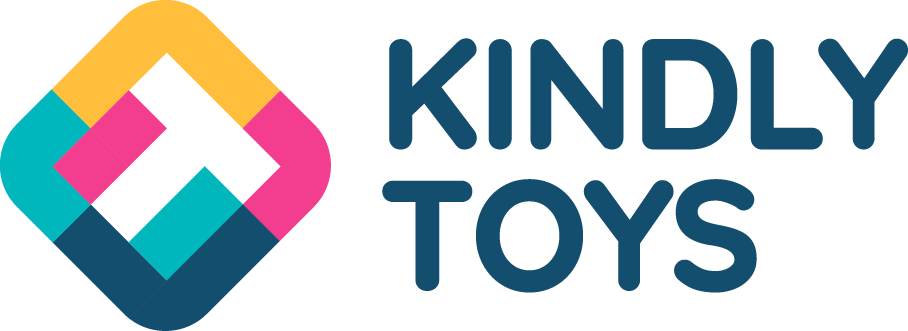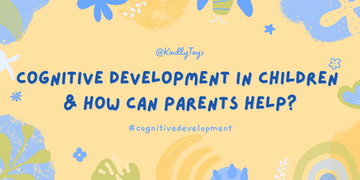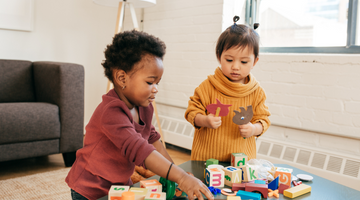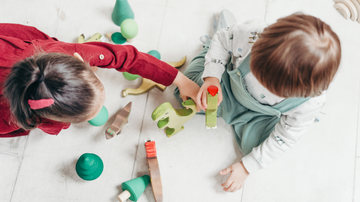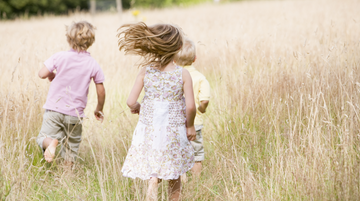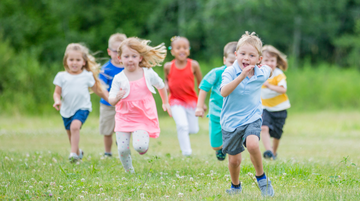What is cognitive development?
Among the 4 main areas of development (motor, social emotional, language, and cognitive), Cognitive Development refers to a child’s intellectual skills. It is the way children think, explore and figure out the world around them. It also includes how children process information, their understanding of concepts and their ability to learn expressive and receptive language and their perceptual skills.
In the past, people used to believe that children weren’t capable of thinking as well as adults. However, Jean Piaget's theory of cognitive development had proved the opposite. It’s not that children can’t think as well as grown ups, they just simply think differently. And cognitive development in babies actually starts from birth. Children would gradually grow and develop their cognitive abilities across different stages throughout their childhood.

Source: Sisters reading photo by gpointstudio on Freepik
Examples
There are many types of cognitive skills and complex thinking processes that children reach at different ages. Some examples of cognitive development in early childhood are:
- Responding to their name
- Understanding the difference between the present and the past
- Knowing something is there even if they can’t see it
- Reading
- Recognizing and naming objects in a book
- Counting to 10
Piaget Stages of Development
As mentioned above, a child would typically go through 4 stages of cognitive development. This theory of cognitive development was brought about by Jean Piaget - a French psychologist and developmental biologist. He believed that intelligence grows and develops through a series of stages. He also proposed that children are not less intelligent than adults, they just simply think in a different way. When it was first introduced, Piaget's theory actually broke new ground, and forever changed the way people thought about children’s cognitive abilities.
The four stages of development in Piaget’s theory are:
Sensorimotor stage (from birth to 2 years)
At this stage, babies learn about the world through movements and sensations. They are only aware of what’s in front of them, and have yet to develop a concept of time. Since they don’t know how things will react, they would constantly experiment by grasping, putting things in their mouths or throwing things. Infants around this time also are not yet able to link between words and images or things, since they have not developed expressive and receptive language.
Later on in this stage, around 7 - 9 months, babies will begin to learn about object permanence, which means that things continue to exist even when they cannot be seen. This is quite an important milestone in a child’s cognitive development, and is also a sign that their memories are developing.
Towards the end of this stage, babies will begin to realize they’re separate beings from the people and objects around them. Due to this, they will then be able to begin to attach names and words to objects. This can also be considered another important milestone during this first stage of children’s cognitive development.
Preoperational stage (2 - 7 years)
This is the stage when young children start to think symbolically and learn to use words and pictures to represent objects. They have the ability to make one thing, such as a word or an object, stand for something other than itself. At this same time, their language use also becomes more mature. Children this age also demonstrate animism, which is the tendency to think that non - living objects (such as toys or stuffed animals) have a life and feelings like a person’s.
Despite the development in symbolic thinking and language use, children at this stage’s perception is still based on intuition and not completely logical. Their thinking is dominated by how the world looks, not how the world is. They’re not yet capable of logical reasoning or problem solving. Furthermore, they’re also egocentric, and tend to struggle to see things from the perspective of others.
Concrete operational stage (7 - 11 years)
Approaching this stage, children’s thinking becomes more logical and organized, but also tends to be very rigid and literal. And despite the development in their thinking abilities, they still struggle with abstract or hypothetical concepts.
During this same time, children also start to become more aware of external events. Due to this, they become less egocentric, and understand that their thoughts are unique to themselves, and might not be shared by others.
Formal operational stage (12 years + )
Reaching this age, children will gain the ability to think in an abstract and logical manner, no longer relying entirely on concrete thinking like before. They will also be able to deal with abstract ideas and solve hypothetical problems. There’s no longer a need to attach certain images to abstract ideas in order to understand it anymore. For example, a child this age does not need to think about slicing up cakes or dividing up sweets to understand subtraction and division.
There’s also an increase in logic and the ability to use deductive reasoning. Older children and young adults are also more capable of seeing multiple potential solutions to problems and think more scientifically about the world around them. They gradually get a better understanding about, and in some cases even heightened interest in moral, philosophical, ethical, social, and political issues.
How can parents help?
Similar to other areas of development, this growing process takes place throughout a long period of time, and some phases cannot be skipped. However, there are still some simple activities that parents can do to help promote cognitive development in children.
Reading
Reading is a super simple, cost - effective and fun activity to help build cognitive skills in children, especially pre - schoolers. The vocabulary of a child that reads regularly will also be more developed than that of a child that rarely reads. For toddlers, parents can read to them and let them interact with the photos and letters. For older children, parents can encourage them to read on their own. Some other benefits of reading are:
- More developed vocabulary
- Familiarity with language patterns
- Developed thinking skills
- Developed writing skills
- Developed listening skills
- Better attention span
- Better memory
Nursery Rhymes
Nursery rhymes have been around for a long time, but they’re more than just a fun activity children enjoy. They are actually highly stimulating and a great cognitive activity for preschoolers and toddlers.
Nursery rhymes, songs, poems all teach young children language patterns and vocabulary. Most importantly, they build a child’s auditory perceptual skills, which is the ability to interpret and attach meanings to sounds.
Some types of nursery rhymes are:
- Classic nursery rhymes and songs
- Poems
- finger rhymes, action rhymes
Puzzles
Puzzles are a great activity to train children’s cognitive skills, as they require a high level of concentration and effort to complete. Throughout the puzzle solving process, children will also be able to learn problem - solving skills, as well as determination.
The key to a fun and effective playtime with puzzles is that the puzzle should be challenging, but doable. Choose one that is appropriate for your child’s age. The younger your child, the fewer pieces the puzzle should have and the bigger they should be.
Kindly Toys’ Letters and Animals puzzle is a great choice for toddlers to practice their cognitive and motor skills, while having fun.

Source: Children playing with toys by gpointstudio on Freepik
Free Play
Often overlooked in modern times, free play is actually a great activity for children to develop many of their skills, cognitive included. Children are naturally curious, and their instinct is to explore their surroundings. And they should be given the time to themselves to do that, instead of constantly being bombarded by activity after activity. Allow them the freedom to choose what they want to explore, and intervene as little as possible. Sometimes, simple really is the best.
